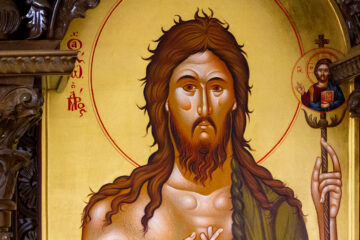Protopresbyter Themistoklis Mourtzanos
‘In exactly the same way as we fast from food, so our tongue should also fast from defamation and lies, from idle talk and condemnation of our neighbor, from anger. By the same token, we must fast with our eyes, so that we don’t gaze at shallow things, we don’t look brazenly and shamelessly. The same is true of all the senses’ (Abba Dorotheos).
The period of the fast takes up a tithe of the year. The Church deliberately gives us this opportunity, during this blessed period, to take a look at our time in a different way: that of ascetic effort and the self-knowledge which allows us to see ourselves and our neighbors through a different prism, that of love and of transcendence of the feeling that we’re the center of the universe.
This is achieved by a re-definition of what the senses are for us: the source of love, life and light; or the path of self-aggrandizement and the view of other people as objects to be exploited for our own benefit. The ascetic tradition is clear: fasting from food is the basis for fasting from the passions. The tongue is not to become an instrument for judging one’s neighbor because of our anger, censure or fatuous gossip. Our eyes shouldn’t covet our neighbor’s good fortune, nor should they gaze at things in a lewd manner. The same is true of the other senses: they can become the means of reconciliation, love, or at least the avoidance of altercation, contention and the appropriation of others as if they were ours to use as we wish. Everything should work from the perspective of meeting others, communicating with them, and opening our hearts. Moreover, the time of the fast should make us see, calmly and through prayer, what it is that unites us, separates us, and wounds us as regards other people, so that we can overcome what is, in the end, our loneliness.
For many people today, young and old, the fast is considered to be a change of diet, based on our customs and traditions. It’s associated with a return to the Church, preparation for Easter, not so much from faith in the experience of the resurrection and our expectation of it, but more because of the joy and change that the Feast brings and the return of life to its normal rhythm. An abundance of Lenten food makes the fast easier, as regards our choices and what we deprive ourselves of, but it also makes us lose sight of its significance. And given that a secular attitude and indifference to religion dominate the majority of outlets that shape our life (media, internet, entertainment and hospitality), we actually don’t have much of a change, nor a real tithing of our time.
The key, once again, is the family. The fast can be an opportunity for the members to gather more frequently around the common table. To fast from particular individual choices. To meet at the Lenten assemblies in church, especially the afternoon presanctified liturgies, the salutations and the Sunday services. We can look again at our character, and at the schedules of our life, and ask more of ourselves. We should stop looking at others as a means to achieve some personal triumph and should devote more time to the prospect of love. The word of God, prayer, study, confession, alms, are all ways which contribute.
Source: pemptousia.com



0 Comments